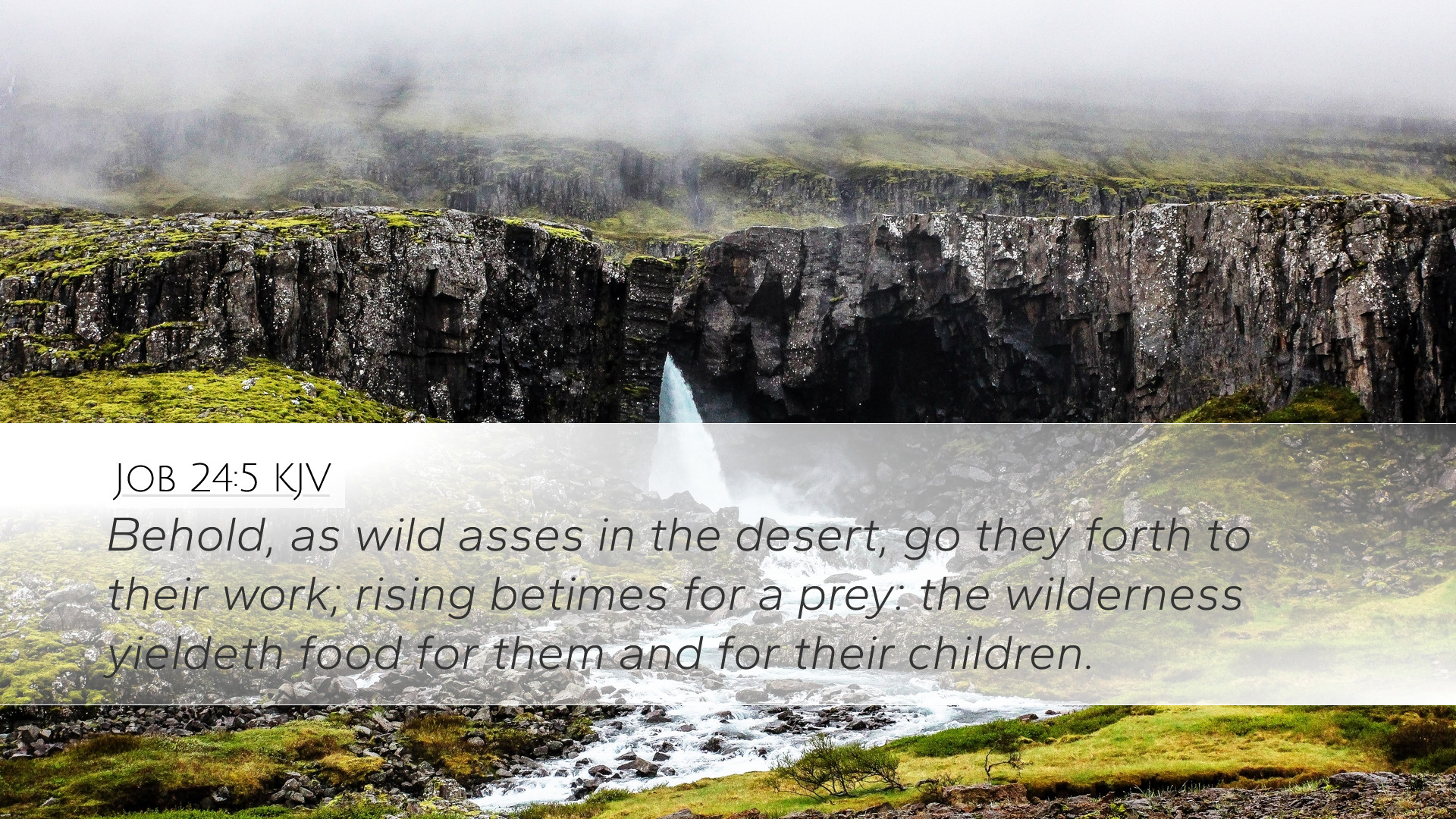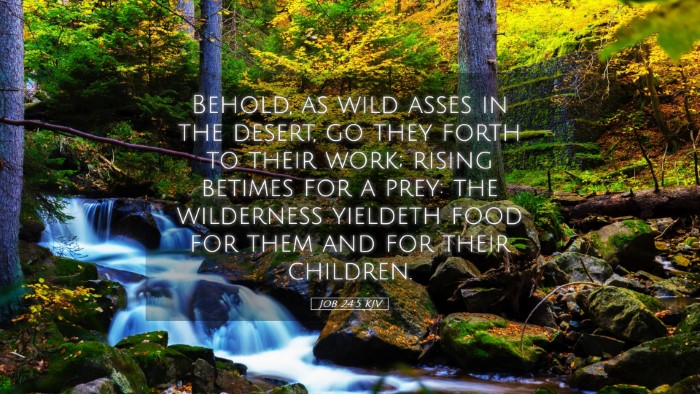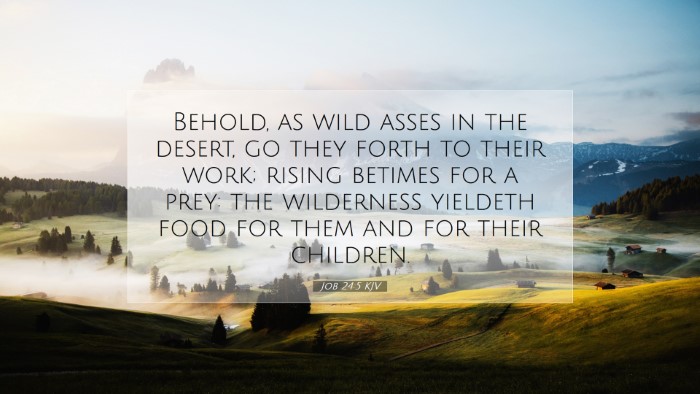Old Testament
Genesis Exodus Leviticus Numbers Deuteronomy Joshua Judges Ruth 1 Samuel 2 Samuel 1 Kings 2 Kings 1 Chronicles 2 Chronicles Ezra Nehemiah Esther Job Psalms Proverbs Ecclesiastes Song of Solomon Isaiah Jeremiah Lamentations Ezekiel Daniel Hosea Joel Amos Obadiah Jonah Micah Nahum Habakkuk Zephaniah Haggai Zechariah MalachiJob 24:5
Job 24:5 KJV
Behold, as wild asses in the desert, go they forth to their work; rising betimes for a prey: the wilderness yieldeth food for them and for their children.
Job 24:5 Bible Commentary
Commentary on Job 24:5
Verse Text: "Like wild donkeys in the desert, the poor go about their labor of foraging for food; the wilderness yields food for them and for their children." (Job 24:5, NIV)
Introduction
This verse from the book of Job reflects on the plight of the poor and the seemingly chaotic order of the world. Job, amidst his suffering, observes the injustices around him, particularly the struggles of the disadvantaged. This commentary draws from insights of prominent public domain theologians such as Matthew Henry, Albert Barnes, and Adam Clarke.
Contextual Overview
Job 24 is part of a larger discourse wherein Job addresses the prevailing injustices he observes in society. His dialogue serves as a challenge against the idea that suffering always correlates with wrongdoing. In Job 24:5, Job uses a vivid metaphor to illustrate the struggles of the poor, comparing them to wild donkeys in the desert. This imagery underscores their desperate search for sustenance in a harsh environment.
Insights from Matthew Henry
According to Matthew Henry, this verse illustrates a profound truth about the human condition. He argues that just as wild donkeys must navigate a desolate landscape in search of food, the poor labor tirelessly yet seem to find little reward. Henry emphasizes the following points:
- Desperation of the Poor: The reference to wild donkeys highlights the desperation of those in poverty. It signifies their laborious efforts as they seek basic necessities, a vivid reminder of their marginalized status.
- God’s Sovereignty: Job’s observation provokes a contemplation of God’s role in human suffering. Henry notes that while the wicked may prosper, the just seem to suffer, calling into question the apparent divine order.
- Nature of Divine Justice: Henry encourages readers to reflect on how divine justice operates. The disparity between the rich and the poor causes the faithful to seek deeper understanding of God’s plans, even in the face of injustice.
Insights from Albert Barnes
Albert Barnes provides a complementary perspective, focusing on the social and existential components of Job's statement. He elucidates the following themes:
- Social Commentary: Barnes suggests that Job articulates a social critique, addressing how society overlooks the struggles of the poor. The metaphor of the wild donkey illustrates not just their toil, but also the lack of support or compassion from a broader societal framework.
- Existential Reflection: Barnes points out that this verse invites a reflection on human existence and purpose. Just as wild donkeys reflect nature’s struggle, so too do individuals navigate life’s burdens. The pursuit of sustenance often means confronting the harsh realities of existence.
- God's Interaction with Humanity: Barnes contemplates the silence of God in the face of such suffering. He articulates a theological inquiry into God’s plans, suggesting that divine justice may often be hidden from human view.
Insights from Adam Clarke
Adam Clarke approaches the verse with a focus on the human spirit under duress. He provides a detailed analysis of the emotional landscape pertaining to those who toil in poverty:
- The Emotional Toll: Clarke notes that the relentless pursuit of survival imposes a significant emotional burden on the poor. The imagery suggests not only physical exhaustion but a depletion of hope.
- God’s Care for the Afflicted: Clarke reassures readers that despite the hardships, God possesses a special regard for those who suffer unjustly. This assurance serves as a source of comfort and encouragement for believers.
- Call to Action: Clarke emphasizes a call to the community to recognize and respond to the needs of the poor. The verse can prompt a compassionate response from those who are able to help, urging society to act in justice and mercy.
Theological Implications
The reflections on Job 24:5 yield rich theological insights:
- The Problem of Evil: This verse contributes to the ongoing discourse about the problem of evil and suffering. It raises questions about why the righteous suffer and highlights the complexities of God’s governance in the world.
- The Call for Justice: The plight of the poor as depicted in this verse is a clarion call for justice. It urges society to take action and advocate for those who are marginalized, reflecting God's concern for the downtrodden.
- Hope in Despair: Despite the bleak circumstances, the commentary challenges readers to find hope in God’s ultimate justice and providence, encouraging them to trust in divine timing and purpose.
Conclusion
Job 24:5 serves as a poignant reminder of the struggles faced by the poor and the injustices present in society. Through the insights of Henry, Barnes, and Clarke, we gain a multifaceted understanding of this verse. It calls for not only theological reflection but also a practical response to the needs of the less fortunate. As pastors, scholars, and students of the Word, may we be moved by the plight of the oppressed and work towards a more just and compassionate world.


